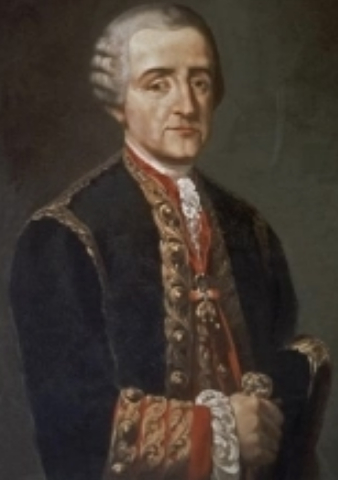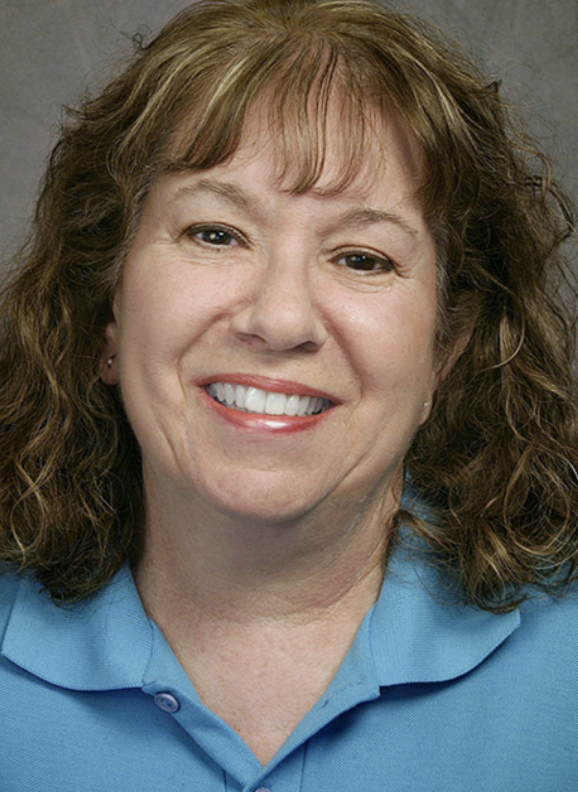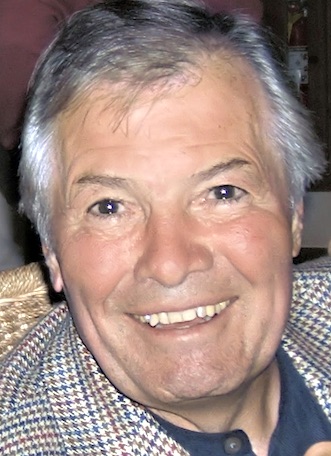December 18
Pedro Pablo Abarca Aranda

On this date in 1719, Spanish statesman Pedro Pablo Abarca de Bolea y Jiménez de Urrea, later the 10th count of Aranda, was born in northern Aragon. He started ecclesiastical studies in the seminary of Bologna, but at age 18 changed to the Military School of Parma. In 1740 he was severely wounded in combat in the War of the Austrian Succession. He then lived in Paris, where he met Diderot and Voltaire and studied the Encyclopédie and Enlightenment movements.
After an ambassadorship to Poland, Aranda became governor of Valencia in 1764. When Charles III was driven from the capital in a 1766 riot, he summoned Aranda to Madrid and made him president of the Council of Castile. Until 1773 he was the most important government minister in Spain. He restored order and aided the king in his work of administrative reform.
Perhaps his greatest achievement, which endeared him throughout Europe to the philosophical and anti-clerical parties, was his work on behalf of the suppression and expulsion of the Jesuits, whom the king considered responsible for the 1766 riot.
Aranda was well-known to American revolutionaries as a supporter. His open sympathy with the French Revolution in 1789 brought him into collision with reactionary forces in Spain and he was imprisoned for a short time at Granada and threatened with a trial by the Inquisition. The proceedings did not go beyond the preliminary stage and he died at age 80. (D. 1798)
Susan Sackett

On this date in 1943, Susan Sackett was born in New York City. Growing up in both Connecticut and Florida, Sackett dreamed of working in Hollywood. After receiving a bachelor’s (1964) and master’s of education (1965) from the University of Florida in Gainesville, she taught at an elementary school in Miami for two years. Deciding to pursue her dream, she quit her teaching job, moved to Los Angeles and spent the next four years working as a publicity assistant and commercial coordinator for NBC.
In August 1974, Sackett met and became the personal executive assistant of Gene Roddenberry, the creator of the legendary television series “Star Trek.” Sackett served as a production assistant for the first “Star Trek” film (1979) and worked closely with Roddenberry on the next five “Star Trek” movies. Working as a production associate during the first five seasons of “Star Trek: The Next Generation,” (1987-94), Sackett and writing partner Fred Bronson sold several stories and teleplays to the series. She worked for Roddenberry for 17 years until his death in October 1991.
Sackett has written several books, including Letters to Star Trek (1977), Star Trek Speaks! (1979, with Fred and Stan Goldstein), The Making of Star Trek: The Motion Picture (1980, with Roddenberry) and a memoir, Inside Trek (2002). She also wrote You Can Be a Game Show Contestant and Win! (1982, with Cheryl Blythe), Primetime Hits (1993) and Hollywood Sings! (1995).
Sackett is a member of MENSA, the Academy of Television Arts and Sciences and the Writer’s Guild of America. She moved to Arizona and became active in her local American Humanist Association chapter in 1994. She has been an FFRF member since 1995 and became a Lifetime Member in 2007.
“I cannot find any good evidence for the existence of any gods, so I am ‘without a god’ — an atheist.”
— Sackett, Freethought Today (May 2011)
Jacques Pépin

On this date in 1935, renowned chef Jacques Pépin was born in Bourg-en-Bresse, France, the second of three sons born to Jeannette and Jean-Victor Pépin. After World War II, his parents — primarily his mother — opened a restaurant called Le Pélican, where Pépin worked as a child. He started his culinary apprenticeship at Le Grand Hôtel de l’Europe at age 13.
The household was Catholic and Pépin served Mass as an altar boy, though he later would at times tell interviewers he was an atheist. Asked once what dish he would prepare for God, he mentioned his atheism and replied “But probably an omelette with lots of butter. For my wife I made a perfect two-egg omelette with a layer of pressed caviar. Or Eggs Jeannette, a dish my mother made.” (Connecticut Magazine, Sept. 25, 2025)
During his military service in 1956-58, he was a personal chef for three heads of state, including Charles de Gaulle. He moved to the U.S. in 1959 to cook at Le Pavillon in New York City and met chef Julia Child, who became a lifelong friend and collaborator until her death in 2004.
John F. Kennedy and family members were regular guests at Le Pavillon. Pépin declined a job as White House chef after JFK was elected president and went to work for restaurateur Howard Johnson to develop food lines and where he served as director of research and development for a decade.
He opened a restaurant in Manhattan in 1970 and started to appear on talk shows such as “What’s My Line?” and “To Tell the Truth,” where his engaging manner, good looks and humor and charming French accent proved popular. His career as a restaurant chef with grueling days in the kitchen ended with a near-fatal car accident in 1974.
He had 14 fractures, a broken back, broken hips, broken pelvis and two broken arms. Pépin’s left arm was so damaged that doctors considered amputating it but didn’t. His left arm after surgeries was several inches shorter than his right and he lacked the stamina to stand for long periods.
He had already written two cookbooks and the third — the landmark 1976 publication “La Technique” — took home cooks through the essential recipes of French cooking a step at a time and was lavishly illustrated. “La Méthode” followed in 1979. He started teaching around the country. He appeared in his first public television cooking series in 1982 and went on to star in several more, each with a companion cookbook.
Pépin and Child appeared in several award-winning shows and series. In 1996 he introduced his daughter Claudine, born in 1967, with whom he collaborated on three series and companion books. He had married Gloria Augier in 1966. Her parents were Cuban and Puerto Rican, and she introduced those countries’ cooking into his repertoire. They’d met on the ski slopes of Hunter Mountain in upstate New York.
He suffered what was described as a minor stroke at age 79 in 2015 but was released two days later from the hospital amid what was later called a full recovery. He kept active well into his 80s while cooking and writing and published “Jacques Pépin Art of the Chicken: A Master Chef’s Paintings, Stories, and Recipes of the Humble Bird” in 2022.
Gloria, his wife of 54 years, died at age 83, at their home in Madison, Conn. When he was a guest judge on Bravo TV’s “Top Chef” in 2008, he said his ideal “final meal” would be roast squab and fresh peas.
PHOTO: Pépin at the Aspen Food and Wine Classic 2006; photo under CC 3.0.
“No, I am not religious in the context of organized religion. As a friend of mine used to say, ‘I’m an atheist, thank God!’ I was born a Catholic but I have moved away from organized religion.”
— Pépin, answering an interviewer asking if he is religious. (Fatherly.com, Sept. 21, 2017)
